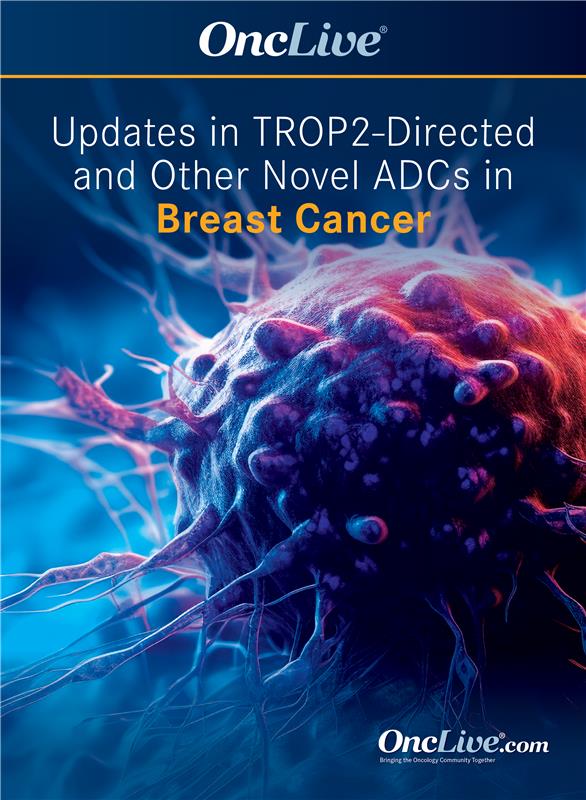Dr Modi on Updated OS Data From the DESTINY-Breast04 Trial of T-DXd in HER2-Low Breast Cancer
Shanu Modi, MD, discusses updated survival data from the phase 3 DESTINY-Breast04 trial evaluating fam-trastuzumab deruxtecan-nxki in patients with HER2-low metastatic breast cancer.
Shanu Modi, MD, breast oncologist, Memorial Sloan Kettering Cancer Center, discusses updated survival data from the phase 3 DESTINY-Breast04 trial (NCT03734029) evaluating fam-trastuzumab deruxtecan-nxki (Enhertu; T-DXd) in patients with HER2-low metastatic breast cancer.
The DESTINY-Breast04 study enrolled patients with unresectable and/or metastatic HER2-low breast cancer who were previously treated with 1 to 2 prior lines of chemotherapy in the metastatic setting, Modi details. Patients with both hormone receptor–positive and –negative breast cancer were included, she notes. A total of 373 patients were randomly assigned 2:1 to receive either T-DXd or physician’schoice of therapy.
Previously reported data from the primary analysis of the trial led to the FDA approval of T-DXd in 2022 for patients with unresectable or metastatic HER2-low breast cancer. Patients with HER2-low breast cancer who had previously received at least 1 chemotherapy regimen in the metastatic setting experienced superior progression-free survival (PFS) and overall survival (OS) vs treatment with standard physician’schoice of chemotherapy.
Updated survival data from DESTINY-Breast04 were presented at the 2023 ESMO Congress, Modi states. The data confirmed that improvement in OS was clinically meaningful with T-DXd vs physician's choice in patients with hormone receptor–positive disease and the overall population, Modi reports.
At a median follow-up of 32.0 months (95% CI, 31.0-32.8), T-DXd (n = 373) resulted in a median OS of 22.9 months in the overall population vs 16.8 months with physician’s choice of chemotherapy (n = 184; HR, 0.69; 95% CI, 0.55-0.86). This translated to a 31% reduction in the risk of death for patients treated with T-DXd. In the hormone receptor–positive cohort, the median OS was 23.9 months (95% CI, 21.7-25.2) )with T-DXd vs 17.6 months (95% CI, 15.1-20.2) with the control.
The median PFS was also consistent with results from the primary analysis, demonstrating a 63% reduction in the risk of disease progression or death with T-DXd vs physician’s choice of chemotherapy in the hormone receptor–positive cohort, and a 64% reduction with the antibody-drug conjugate in the overall population. The median PFS was 8.8 months (95% CI, 8.3-9.8) with T-DXd vs 4.2 months (95% CI, 3.0-4.5) with chemotherapy in the overall cohort (HR, 0.36; 95% CI, 0.29-0.45).
Exploratory analyses of the hormone receptor–negative cohort showed that T-DXd (n = 40) resulted in a median OS of 17.1 months (95% CI, 13.6-23.0) and median PFS of 6.3 months (95% CI, 4.2-8.5) vs 8.3 months (95% CI, 5.6-20.4) and 2.9 months (95% CI, 1.4-4.2), respectively, with treatment of physician’s choice (n = 18), Modi continues. Accompanying hazard ratios were 0.58 (95% CI, 0.31-1.08) for OS and 0.29 (95% CI, 0.15-0.57) for PFS, both in favor of T-DXd.
Regarding safety, the toxicity profile of T-DXd remained well tolerated, manageable, and generally consistent with what was reported in the primary analysis despite the prolonged duration of treatment.
Editor's Note: Clinicians referring a patient to MSK can do so by visiting msk.org/refer, emailing referapatient@mskcc.org, or by calling 833-315-2722.




